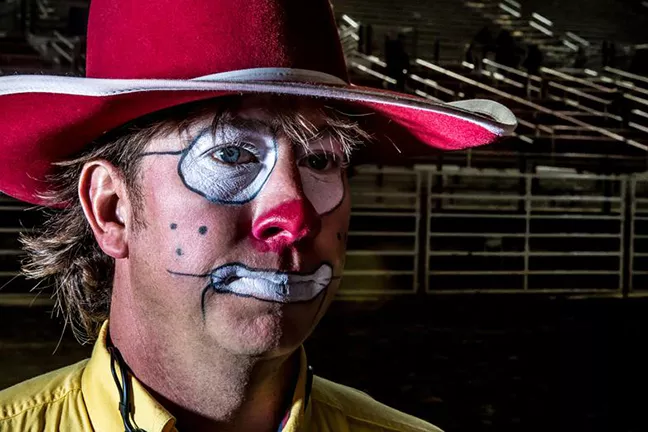Rodeo clown and barrelman John Harrison's wife, Carla Harrison, likes to tell him that he should never doubt the love between them is real. It's definitely not superficial, anyway.
"Little girls don't grow up wanting to marry a rodeo clown," she laughs.
For his part, John, who is appearing at this week's Tucson Rodeo, didn't exactly grow up wanting to be a rodeo clown either. His grandfather, Warren Granger "Freckles" Brown, was a hall of fame rodeo performer from the 1930s all the way through the 1970s, best known for riding Tornado in 1967—a bull previously known as "unrideable" because it threw more than 200 riders before Brown stayed on it for a full eight seconds.
"I tried riding bulls, and I wasn't near tough enough," John says.
He started trick roping when he was 6, then moved onto Roman riding (the thing where cowboys stand with their feet on two different horses and ride them around like a pair of potentially volatile skis). His first time clowning was when he was 23, and someone begged him to fill in for a last-minute cancellation.
"I sucked the first time," he says. "I remember getting booed, people saying, 'Clown, you suck!'"
But he started practicing, and he got better. These days, he's on the road performing at rodeos about nine months out of the year. His job is to entertain people from the beginning of the rodeo to end—he banters with the announcer between runs, he interacts with the crowd. (He's been known to approach audience members talking on their cellphones and take the phone from their hands, carrying on a conversation with whoever is on the other end.) But the barrelman portion of his job means he plays a role in keeping bullriders safe, literally distracting the bull when a rider is bucked off or jumps off (and then ducking into a barrel for relative safety).
General manager of the Tucson Rodeo Gary Williams says asking John to come to the rodeo was a no-brainer. In fact, they hired him to come to town a few years ago, but he broke his leg trick riding at another rodeo and couldn't make it.
"John's part of a pretty select group of rodeo clowns and barrelmen that are absolutely at the pinnacle of our sport," Williams says. "He's a good mix of athleticism and humor... The kind of icing on the cake as far as John as a person is he's super committed to his family, and in his life. Nothing comes before his family."
John certainly isn't the only person in the world of rodeo with strong family values. Many members of the rodeo community have their Christian faith and traditional belief systems in common. And they never hesitate to help one of their own. Williams has seen examples time and time again of, say, a bull rider's luggage getting lost by an airline, and all of the other bull riders—his competitors, technically—loaning him what he needs to do his ride. Carla's theory: in some ways, both church and rodeo get you to the heart of the human experience, allow you to reflect on life and its proximity to death.
"I feel like so many of us are religious because so many of us are tied to life-and-death situations," she says. "Most of our rodeo people have livestock at home, and when you raise livestock, you understand that part of life is death. So you understand that to raise this livestock, sometimes you have to reach out for help."
John and Carla had their own chance to do just that a few years ago. They have three children—Addy (11) Caz (9) and Charlie (3). They lost Billie, who would be 5 today, when she was just 18 months old. They'd spent years introducing their kids to rodeo friends all over the country and attending cowboy churches with people they'd just met in strange cities. But they were still blown away by the support they received.
"People came from everywhere, from California to the East Coast," John says. "There were 800 people at the service. In the rodeo family, when something happens, everybody gets together."
If John and Carla didn't expect to become a rodeo clown and a rodeo clown's wife, they certainly didn't expect that they and their children would become known throughout the national rodeo community as "the clown family." (Carla's sister addresses all of her mail to their house in Oklahoma accordingly.) Everyone who meets their kids loves them, and the older two often help their dad with his act—Addy is learning to trick ride and Caz works the mutton busting for other kids. The Harrisons have built a life centered around this sport. After all, is there any other way to rodeo?
"People don't just rodeo," Williams says. "They live it."
The Tucson Rodeo stretches from Saturday, Feb. 16, to Sunday, Feb. 24, at the Tucson Rodeo Grounds, 4823 S. Sixth Ave. Tickets range from $16 to $33 for normal seating or $70 for the covered seating, private hospitality, lunch, beverage tokens and free parking pass that comes with the Vaquero Club. See tucsonrodeo.com for more information, including about the top-of-the-line Gold Buckle box seating.








